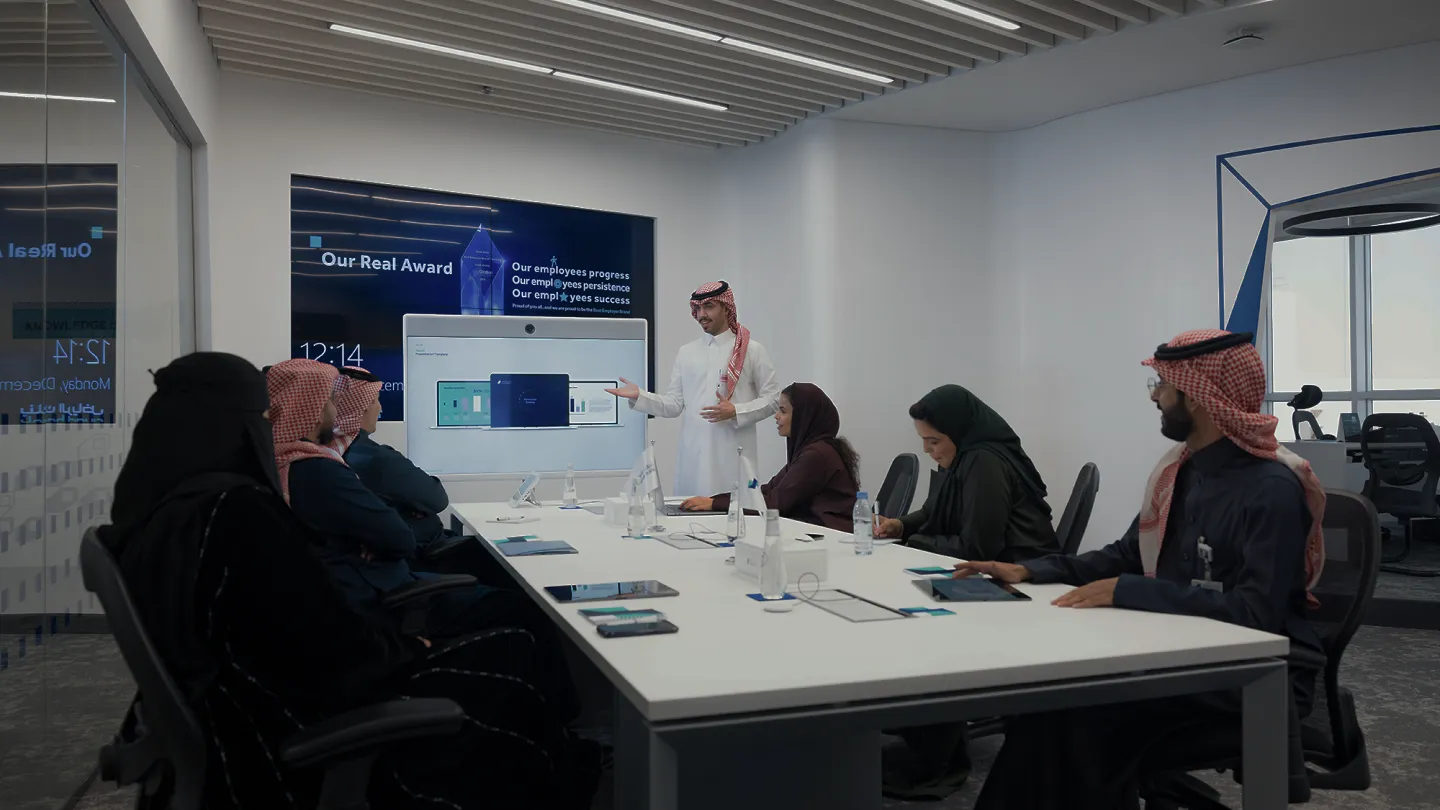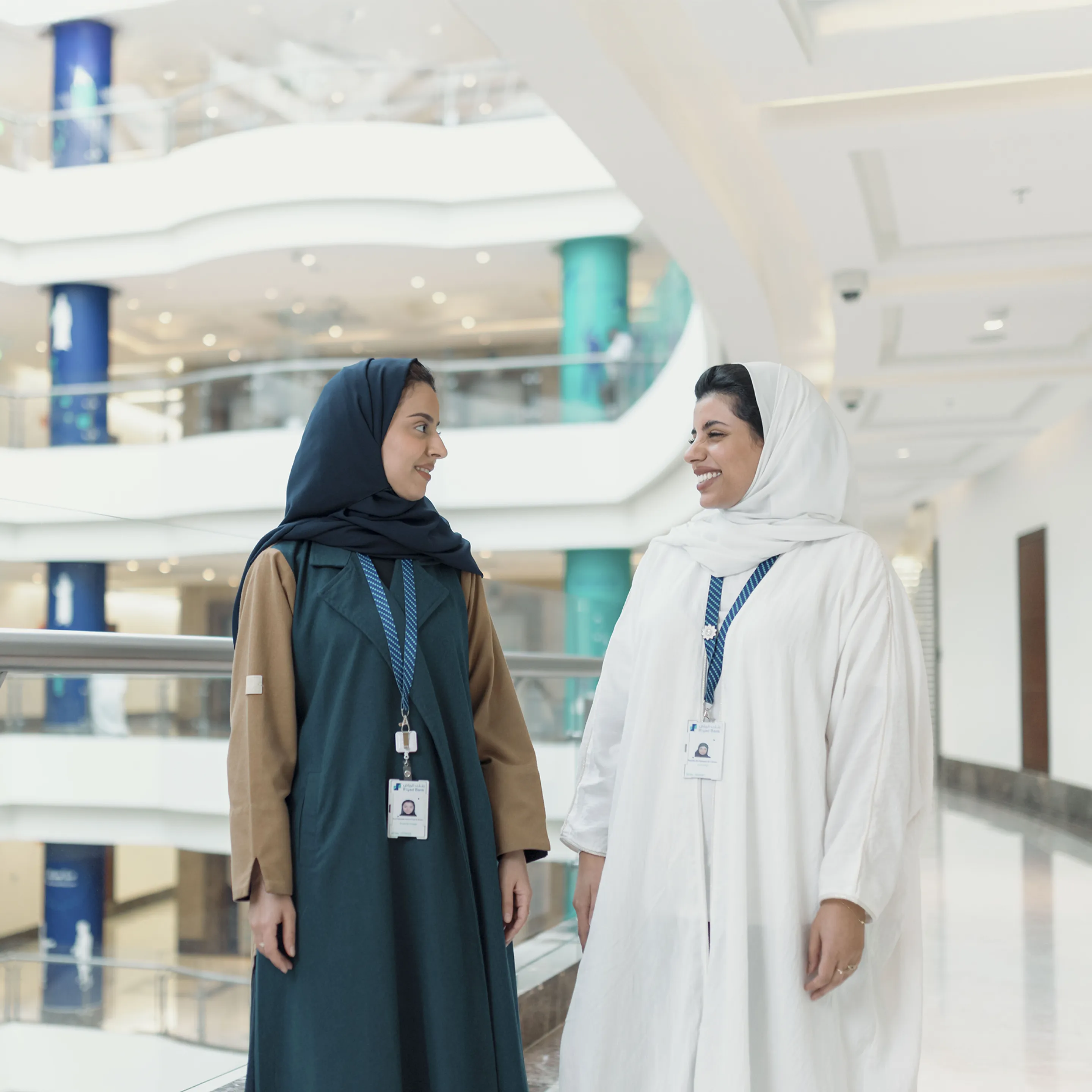

ESG Review
Sustainability Strategy
and ESG Framework
ESG Awards and Recognitions

Forbes: Top 50 Saudi Brands in CSR.

Euromoney: Best Bank for Corporate Responsibility in Saudi Arabia.

Euromoney: Best Bank in Diversity and Inclusion in Saudi Arabia.

National Social Responsibility Award.

Prince Muqrin Award for Social Responsibility.

ISO 26000 Certification renewal.

Social Responsibility Award for Companies (Silver Category) presented by the Minister of Human Resources and Social Development.
Sustainability Governance
Sustainability Governance Structure
In line with Riyad Bank's commitment for clear sustainability governance at the Board and Management levels, along with clear KPIs and incentives, and effective reporting and communication, the 3 tiers of governance and the respective mandates are outlined below:
1
Board Sustainability
Committee
- Set the direction for sustainability, including the KPIs.
- Challenge and approve the sustainability strategy and plan – monitor and oversee implementation.
- Challenge and approve sustainability disclosures.
- Oversee impact of sustainability-related risks and opportunities to the Bank’s activities.
- Oversee sustainability impact on the Bank’s activities.
2
Sustainability
Committee Chaired
by the CEO
- Develop sustainability strategy and plan.
- Implement sustainability strategy and plan (e.g., support creation of policies and commitments).
- Approve targets and monitor progress.
- Manage impact of climate-related risks and opportunities to the Bank’s activities.
- Prepare ESG disclosures aligned with local regulatory standards.
3
Sustainability
Working Group
- Deliver on sustainability strategy and plan, in alignment with the Bank’s mission and vision.
- Develop sustainability goals that align with the Bank’s mission and vision.
- Develop and advocate for policies.
- Raise awareness to educate employees on sustainability issues and practices.
- Monitor progress on established goals and support in implementation of priority initiatives.
Sustainability is deeply embedded in Riyad Bank’s corporate strategy, driving value creation and long-term resilience. By integrating sustainability into business planning, the Bank supports the Saudi Green Initiative and the transition to a low-carbon economy. Riyad Bank has developed a comprehensive, Bank-wide sustainability strategy with a detailed 3-year roadmap to ensure effective execution and widespread impact.
Riyad Bank conducted a rigorous materiality assessment to identify the most critical sustainability matters shaping its long-term strategy. This structured approach involved reviewing global best practices, assessing the Bank’s existing strengths, benchmarking against industry leaders, and designing strategic initiatives to address gaps. By prioritizing sustainability issues based on both
financial and impact materiality, the Bank ensured alignment with internationally recognized frameworks such as the UNEP FI Impact Protocol, the SASB Materiality Finder, and the EU’s Corporate Sustainability Reporting Directive. The assessment also incorporated insights from regulators, ESG rating agencies, industry peers, and investors, refining the Bank’s sustainability focus to drive meaningful progress.
Climate Action
Riyad Bank is actively working to reduce its climate impact through both operational and financed emissions reduction initiatives. The Bank has committed to achieving net zero emissions for its own operations (Scope 1 and 2) by 2035. It established a 2023 emissions baseline using the GHG Protocol and SBTi guidance, prioritizing emissions avoidance and reduction overcompensation. To reach net zero, Riyad Bank has identified several decarbonization levers to be implemented, including:
- Improving energy efficiency through air conditioning upgrades.
- LED lighting.
- Using double glazing on windows.
- Replacement of high emission refrigerants with gases that have a lower global warming potential.
Sustainable Finance
Riyad Bank actively contributes to Vision 2030 by financing and accelerating the energy transition, catalyzing a new wave of sustainable investment to help the Kingdom reach net zero emissions by 2060. The Green and Renewable Banking offerings are at the heart of these efforts, enabling the Bank to drive impactful change and support environmentally responsible projects across sectors.

Riyad Bank’s strategy consists of 3 main pillars:
They are the principles that guide every activity the Bank undertakes, and every effort it makes.
The ultimate objective of the Bank’s Bukra strategy is to advance the Kingdom’s social development agenda as CSR leader.
Global CSR Forum
Riyad Bank proudly participated as a strategic partner in the first Global CSR Forum, held under the patronage of King Salman bin Abdulaziz Al Saud and organized by the Ministry of Human Resources and Social Development. During the Forum, Riyad Bank launched its “Bukra Initiatives Social Impact Report for 2023”. This report highlights the Bank’s knowledge and contributions to the environment, economy, community, as well as its commitment to Sustainable Development Goals.
Riyad Bank Musical Play “For Tomorrow”
Riyad Riyad Bank, in collaboration with the Theater and Performing Arts Commission, successfully launched the musical play “For Tomorrow” at Princess Nourah Bint Abdulrahman University on 20, 21, and 22 June. The family event aimed to promote social responsibility values within the younger generation. The 3 day show attracted 2,112 attendees, and the ticket proceeds were donated to Sanad Children’s Cancer Support Association.
World Blood Donor Day
Riyad Bank launched a comprehensive blood donation campaign across multiple locations, including Riyadh, Jazan, Jeddah, Al-Khobar, Najran, Al-Esha, Al-Qassim, Al Madina, and Hafar Al-Batin. This initiative aimed to engage both employees and the wider community. The campaign achieved significant participation and impact. 1,019 Donors contributed to saving 3,057 lives.
Empowering People
Learning and Development
| Topic | 2023 | 2024 |
|---|---|---|
| Total training hours | 372,584 | 205,128 |
| Average training hours per employee | 3.9 | 3.2 |
Employee Incentive Programs
| Statement | Investment Savings (% '000s) | ||
|---|---|---|---|
| Employees’ Share | Bank’s Share | Total | |
| Balance at the beginning of the year | 64,491 | 24,032 | 88,523 |
| Deposits in 2024 | 19,841 | 6,591 | 26,432 |
| Withdrawals in 2024 | -20,060 | -5,473 | -25,533 |
| End-of-year Balance | 64,272 | 25,150 | 89,422 |
| Topic* | 2023 | 2024 |
|---|---|---|
| Total Workforce | 5,870 | 5,683 |
| Breakdown by gender | ||
| Females | 1,698 | 1,640 |
| Males | 4,172 | 4,043 |
| Breakdown by nationality | ||
| Saudi Nationals | 3,973 | 3,868 |
| Non-Saudi nationals | 1,897 | 1,815 |
| Breakdown by age | ||
| <30 | 1,254 | 1,353 |
| 31–50 | 4,330 | 4,078 |
| >50 | 286 | 252 |
| Inclusion | ||
| Number of employees with disability | 56 | 56 |
*This represents the Bank's full-time employees.

Riyad Bank acknowledges that sustainability-related risks, particularly climate risks, are financial risks. To address this, the Bank is developing a comprehensive risk management framework to assess and mitigate ESG risks across its operations. This framework integrates climate risk considerations into lending and investment decisions, enhances scenario analysis, and strengthens resilience against environmental and regulatory changes, ensuring long-term financial stability and responsible growth.
To support this, the Bank has developed a climate risk heatmap, a qualitative tool designed to identify sectors most exposed to climate-related risks. The heatmap leverages multiple data sources, including:
- The Saudi and Middle East Green Initiatives.
- The G20 Climate Risk Atlas.
- Assessments from UNEP FI, Moody’s, and SASB.

Metrics and Targets
Based on Riyad Bank’s materiality assessment, the following nine initiatives have been identified and classified as ‘priorities to maintain’:
| Topic | Initiatives |
|---|---|
| Climate Action | a. Manage environmental impacts of own operations (e.g., water and waste). |
| Enhance Financial Well-being |
b. Reduce youth employment. c. Support SMEs. d. Enhance financial access and literacy. |
| Empower Communities |
e. Empower women. f. Empower people with disabilities. |
| Employee Health and Well-being | g. Provide best possible work environment for our employees. |
| Business Ethics | h. Prioritize transparency, accountability, and ethical practices through robust frameworks. |
| Data Security | i. Sound process to identify and counter cyberattacks and ensure data security to customers and partners. |
Riyad Bank aspires to lead the way in sustainability within the banking sector across the region. This commitment is grounded in the Bank’s firm belief that a robust sustainability strategy can drive meaningful benefits for its clients, investors, and society at large, creating lasting value for all its stakeholders.



Investor Relations Department
Address: Al Shuhada District Eastern Ring Road, Granada Oasis – A1 Tower
P.O. Box 22622, Riyadh 11416 Saudi Arabia. Email: investor.relations@riyadbank.com
